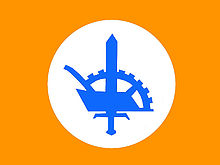- Verdinaso
-
The Verdinaso (Verbond van Dietsche Nationaal-Solidaristen - Union of Diets National Solidarists) was an authoritarian and fascist-inspired political party in Belgium and the Netherlands during the 1930s. It was founded by Joris Van Severen, Jef François, Wies Moens, and Emiel Thiers on October 6, 1931 (at the Hôtel Richelieu in Ghent), and, in 1937, developed a paramilitary wing that wore green shirts (DINASO Militanten Orde).
Contents
Character and history
The party was against the parliamentary democracy and eventually advocated a corporative society ruled by the Belgian King. As such it never participated on elections, and never became a strong political pressure group.
The Verdinaso originally advocated Flemish and Dutch nationalism. It proposed the union of Flanders with the Netherlands and Luxembourg to form a Dietsland or Diets Rijk ("Dutch Empire" - see Greater Netherlands), justifying this on the basis of a common history of the three lands under the Burgundians, and the emblematic rule of Charles I. In 1932, two of its leaders, François and Van Severen, were elected to the Chamber of Deputies; the same year, the party was joined by Victor Leemans, who wrote the work Het nationaal-socialisme, an apology of Nazism.
After 1934, Verdinaso shifted its focus towards a Belgian identity circa 1939, becoming a bilingual (French-Dutch) party, believing that the Belgian state should be founded on Roman Catholic corporatism - an economic model interpreted by Verdinaso from the Catholic social teaching, and akin to Integralism and the Action Française (an influence on Van Severen). The party virulently opposed Communism on the left and liberal capitalism on the right; it was also somewhat antisemitic, occasionally venting the opinion that Jews, as well as Freemasons constituted a hidden power working against the interests of Dietsland.
In the elections of May 24, 1936, Verdinaso ran on a common list with other Flemish nationalists under the common denominator Vlaams Nationaal Block, gaining 13% of the vote and 16 deputy seats; in 1939, it peaked at 15% of the vote and 17 seats. The DINASO Militanten Orde had around 3,000 members, grouped under the leadership of François, and edited the newspapers Recht en Trouw and De Vlag (placed under the leadership of Moens).
When World War II broke out Van Severen was killed in Abbéville, France, suspected of being an agent of Nazi Germany, and as part of a mass execution of Rexists and Belgian communists (both groups were suspected of pro-German activism, justified by the Molotov-Ribbentrop Pact in the case of the latter). As a consequence, the Verdinaso lost a clear direction (despite Van Severen's replacement with François), and was eventually forced to join the Flemish National Union on May 5, 1941. Some of Verdinaso's members, who were advocating a strong Belgian authoritarian regime around King Leopold III, however joined the resistance against the German occupation.[1]
Notable members
- Jef François
- Louis Gueuning
- Ward Hermans
- Victor Leemans
- Wies Moens
- Emiel Thiers
- Joris Van Severen
References
- ^ (Dutch) De Bock, Walter. Extreem-rechts en de rijkswacht op 25 oktober 1936 : een poging tot staatsgreep in België ("The extreme right and the Gendarmerie on 25 October 1936 : an attempted coup in Belgium"). pp. 16–17. in : De Bock, Walter; et al. (in Dutch). Extreem-rechts en de staat ("The extreme right and the state"). Antwerpen: Uitgeverij EPO. pp. 11–58. ISBN 90-6445-971-1.
External links
- L'Extrême droite en Flandre hier
- Rues sans complexes - Belgian fascists that some streets were still named after in 1999 (short biographies).
Fascism and Nazism in Belgium to 1945 Political parties and groups People Staf De Clercq · Léon Degrelle · Jean Denis · Hendrik Elias · Jef François · Ward Hermans · Paul Hoornaert · René Lagrou · Victor Matthys · Joris Van Severen · Jef van de WieleSee also 5th SS Volunteer Sturmbrigade Wallonien · 6th SS Volunteer Sturmbrigade Langemarck · Algemeene-SS Vlaanderen · Reichsgau Flandern · Reichsgau Wallonien · District of BrusselsCategories:- Political parties established in 1931
- 1941 disestablishments
- Belgian fascist parties
Wikimedia Foundation. 2010.

